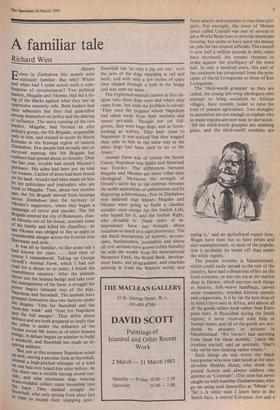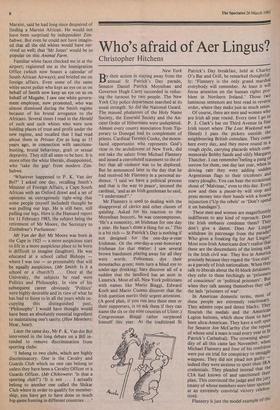A familiar tale
Richard West
Events in Zimbabwe this month were curiously familiar. But why? Where and when had I come across such a com- bination of circumstances? Two political leaders, Mugabe and Nkomo, had led a ris- ing of the blacks against what they saw as Oppressive minority rule. Both leaders had their adherents but they had quarrelled among themselves on policy and the sharing of influence. The more cunning of the two leaders, Mugabe, had formed an elite military group, the 5th Brigade, responsible only to him, and trained in secret by North Koreans in the Inyanga region of eastern Zimbabwe. Few people had actually met or survived meeting this 5th Brigade but rumours had spread about its ferocity. Over the last year, trouble had struck Nkomo's Partisans. His aides had been put on trial for treason. Caches of arms had been found on his land. Attacks had been made on him by the politicians and journalists who are loyal to Mugabe. Then, about two months ago, the 5th Brigade moved from Inyanga across Zimbabwe into the territory of Nkomo's supporters, where they began a campaign of terror and murder. The 5th Brigade entered the city of Bulawayo, chas- ed Nkomo out of his house, arrested some of his family and killed his chauffeur. At last Nkomo was obliged to flee at night in Considerable danger across the frontier into Botswana and exile. It was all so familiar, so like some tale I had known for years ... And then of course I remembered. Taking up George Orwell's Animal Farm, which I had not read for a dozen or so years, I found the resemblance uncanny. After the animals throw out the human beings and take over the management of the farm, a struggle for Power begins between two of the pigs, Napoleon and Snowball. The animals have grouped themselves into two factions under the slogans 'Vote for Snowball and the three-day week' and 'Vote for Napoleon and the full manger'. They differ about defence and are both prepared to imply that t_he other is under the influence of the !ormer owner Mr Jones or of other human beings. A debate begins on whether to build a ‘yindmill, and Snowball has made an in- sPiring address:
But just at this moment Napoleon stood UP and, casting a peculiar look at Snowball, uttered a high-pitched whimper of a kind
(1). one had ever heard him utter before. At s. is there was a terrible baying sound out- .ide, and nine enormous dogs wearing "b,rass-studded collars came bounding into t_tle barn. They dashed straight for ?now. ball, who only sprang from place just in time to escape their snapping jaws.'
Snowball ran 'as only a pig can run', with the jaws of the dogs snapping at tail and heels, and with only a few inches of spare time slipped through a hole in the hedge and was seen no more.
The frightened animals cannot at first im- agine who these dogs were and where they came from, but soon the problem is solved: 'They were the puppies whom Napoleon had taken away from their mothers and reared privately. Though not yet full- grown, they were huge dogs, and as fierce- looking as wolves. They kept close to Napoleon. It was noticed that they wagged their tails to him in the same way as the other dogs had been used to do to Mr Jones.'
Animal Farm was of course the Soviet Union; Napoleon was Stalin and Snowball was Trotsky. The differences between Mugabe and Nkomo are more tribal than ideological. Moreover the strength of Orwell's satire lay in the contrast between the noble aspirations of communism and its disgusting achievements. Few in Zimbabwe ever believed that Messrs Mugabe and Nkomo were going to build a classless socialist state except for the foolish Left, who hoped for it, and the foolish Right, who dreaded it. Three years of in- dependence have not brought about socialism so much as a state plutocracy. The old black bourgeoisie of lawyers, accoun- tants, businessmen, journalists and above all civil servants have grown (often literally) fat with the wealth from the International Monetary Fund, the World Bank, develop- ment loans, aid programmes, and charities pouring in from the Western world; and from salaries and expenses to run these pro- jects. For example, the town of Mutare (once called Umtali) was one of several to get a World Bank loan to provide municipal housing, but seems to have spent the money on jobs for the council officials. The council is now half a million pounds in debt; rents have increased; the tenants threaten to strike against the profligacy of the town hall. In only a hundred years, this part of the continent has progressed from the prin- ciples of David Livingstone to those of Ken Livingstone.
The 'third-world groupies' as they are called, the young left-wing ideologues who attempt to bring socialism to African villages, have notably failed to raise the level of peasant agriculture. Two droughts in succession are not enough to explain why so many regions are now near to starvation. 'All the third-world groupies are smoking grass, and the third-world residents are eating it,' said an agricultural expert here. Wages have risen but so have prices and also unemployment, so most of the popula- tion is probably no better off than under the white regime.
The present troubles in Matabeleland, which could easily spread to the rest of the country, have had a disastrous effect on the local economy, as one can see at the market shop in Harare, which purveys such things as baskets, folk-weave handbags, carved stone ornaments, wooden kitchen utensils and copperware. It is by far the best shop of its kind I have seen in Africa, and almost all of the goods reflect local rather than Euro- pean taste. It flourished during the Smith regime; it never received state help or foreign loans; and all of the goods are pro- duced by peasants or artisans in Matabeleland. 'We haven't had anything from them for three months,' [since the troubles started] said an assistant, 'that's why we're now looking rather empty.'
Such things do not worry the black bourgeoisie who now take lunch at the once all-white Meikles Hotel, who drink im- ported Scotch and always address one another as 'Comrade'. (The term has never caught on with humbler Zimbabweans, who go on using such honorifics as 'Mister' or 'Sir'.) A white man I knew here in the Smith days, a central European Jew and a Marxist, said he had long since despaired of finding a Marxist African. He would not have been surprised by independent Zim- babwe. But even he could not have imagin- ed that all the old whites would have sur- vived so well; that `Mr Jones' would be so popular on this Animal Farm.
Familiar white faces checked me in at the airport; registered me at the Immigration Office (which now boasts a calendar of South African Airways); and briefed me on foreign affairs. Even some of the same white secret police who kept an eye on us on behalf of Smith now keep an eye on us on behalf of Mugabe. I saw one white govern- ment employee, now promoted, who was almost dismissed during the Smith regime because of his brutal arrogance to the Africans. Several times I read in the Herald of such and such whites who were now holding places of trust and profit under the new regime, and recalled that I had read about them in Private Eye as long as 15 years ago, in connection with sanctions- busting, brutal behaviour, graft or sexual depravity. They still all seem to be here. It is more often the white liberals, disappointed, who 'take the gap' from modern Zim- babwe.
'Whatever happened to P. K. Van der Byl?' I asked one day, recalling Smith's Minister of Foreign Affairs, a Cape South African with an Oxford drawl and a set of opinions so outrageously right-wing that some people (myself included) thought he was pulling our legs. He is still here, still pulling our legs. Here is the Hansard report for 11 February 1983, the subject being the retirement of Mr Moore, the Secretary to Zimbabwe's Parliament: Mr Van der Byl: Mr Moore was born at the Cape in 1925 — a more auspicious start to life in a more auspicious place to be born is difficult to imagine (laughter). He was educated at a school called Bishops — where I was too — so presumably that will be equally .auspicious. (Mr Smith: Is it a school or a church?) ... Once at the University, the subjects he read were Politics and Philosophy. In view of his subsequent career obviously 'Politics' were highly desirable and in view of what he has had to listen to in all the years while oc- cupying this distinguished post, 'Philosophy' I would have thought would have been an absolutely essential ingredient to maintaining one's sanity. (Hon Members: Hear, hear).
Later the same day, Mr P. K. Van der Byl intervened in the long debate on a Bill in- tended to remove discrimination from sporting clubs: 'I belong to two clubs, which are highly discriminatory. One is the Cavalry and Guards Club which no one can belong to unless they have been a Cavalry Officer or a Guards Officer. (Mr Chikowere: 'Is that a sporting club?') 'It is not ... I actually belong to another one called the Shikar Club where in order to qualify for member- ship, you have got to have done so much big-game hunting in different countries . '















































 Previous page
Previous page